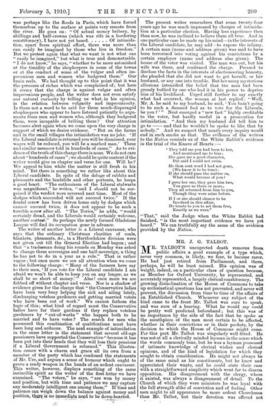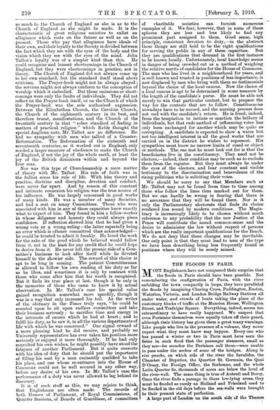MR. J. G. TALBOT.
MR. TALBOT'S unexpected death removes from public affairs a good example of a type which, never very common, is likely, we fear, to become rarer. He had just retired. from Parliament, and there, perhaps, he will be least missed. His opinion was of weight, indeed, on a particular class of question because, as Member for Oxford University, he represented, and accurately represented, a largely clerical constituency. The growing disinclination of the House of Commons to take up ecclesiastical questions has not prevented, and never will prevent, the discussion from time to time of the affairs of an Established Church. Whenever any subject of the kind came to the front Mr. Talbot was sure to speak, and. was sure of a hearing. What he would say could be pretty well predicted beforehand ; but this was of no importance by the side of the fact that he spoke as the mouthpiece of the men most certain to be affected, whether in their convictions or in their pockets, by the decision to which the House of Commons might come. For this part Mr. Talbot was singularly well fitted. He was not at all a clerically minded layman in the sense which the words commonly bear, but he was a layman possessed of intimate knowledge of clerical wishes and clerical opinions, and of the kind of legislation for which they sought to obtain consideration. He might not always be of the same mind as his constituents, but he knew and appreciated their wants, and he could state their case with a straightforward simplicity which went far to disarm opposition. His disagreement with the clergy, where it existed, was always a disagreement of detail. To the Church of which they were ministers he was loyal with the full strength alike of conviction and of feeling. Other men might to all appearance be more ardent Churchmen than Mr. Talbot, but their devotion was offered not so much to the Church of England as she is as to the Church of England as she might be made. It is the characteristic of great religious societies to enlist an allegiance which rests on the future as well as on the present. Those who pay that allegiance have ideals of their own, and their loyalty to the Society is divided between the fact which they see with the eyes of the body and the vision which they see with the eyes of the mind. John Talbot's loyalty was of a simpler kind than this. He could recognise and lament shortcomings in the Church of England, but they were shortcomings in practice, not in theory. The Church of Fng]and did not always come up to her own standard, but the standard itself stood above criticism. The Prayer-book might not be always obeyed ; the services might not always conform to the conception of worship which it embodied. But these omissions or short- comings were only the faults of individuals. They did not reflect on the Prayer-book itself, or on the Church of which the Prayer-book was the sole authorised expression. Between the Elizabethan Church, the Caroline Church, the Church of the eighteenth century in its best, and therefore truest, manifestations, and the Church of the twentieth century in that "sober standard of feeling in matters of practical religion" which Keble thought the special Anglican note, Mr. Talbot saw no difference. He had no sympathy with men who talked of a Counter- Reformation. The Reformation of the sixteenth and seventeenth centuries, as it worked out in -PIngland, only needed a larger measure of obedience to make the Church of England, if not the joy of the whole earth, at least the joy of the British dominions within and beyond the four seas.
Nor was this type of ChurchmanshiP a mere matter of theory with Mr. Talbot. His rule of faith was in the fullest sense his rule of life. With him theory and practice, doctrine and discipline, devotion and conduct, were never far apart. And by reason of this constant and intimate connexion his religion was the true source of his influence. He was largely concerned in good works of many kinds. He was a member of many Societies, and had a seat on many Committees. Those who were associated with him in any of these capacities knew exactly what to expect of him. They found in him a fellow-worker in whose diligence and honesty they could always place confidence. If reflection showed him that he had given a wrong vote or a wrong ruling—the latter especially being an error which is oftener committed than acknowledged— he could be trusted to admit it frankly. He loved the work for the sake of the good which he believed would follow from it, not in the least for any credit that he could hope to derive from it. He never left the prosaic side of a Com- mittee's business to look after itself while he devoted himself to the showier side. The reward of this choice is apt to be long in coming The patient Committeeman is allowed to follow his own reading of his duty as far as be bites, and sometimes it is only by contrast with those who come after him that his worth is recognised. But it finds its true place at last, though it be only in the memories of those who came to know it by actual observation. Li Mr. Talbot's case his special value gained recognition somewhat more speedily, though it was in a way that only increased his toil. As the writer of the obituary in the Times truly says, "he could be counted upon to sit upon endless committees and take their business seriously ; to sacrifice time and " energy in the interests of causes which he had at heart; and to fulfil his duty, as he saw it, in all the various departments of life with which he was concerned." One signal reward of a more pleasing kind he did receive, and probably no University representative has ever taken his position more seriously or enjoyed it more thoroughly. If he had only consulted his own wishes, he might possibly have stood the fatigues of another Parliament. But it quite oonsorts with his idea of duty that he should put the importance of filling his seat by a man eminently qualified to take his place, and one whose re-entrance into the House of Commons could not be well secured in any other way, before any desire of his own. In Mr. Talbot's case the performance of a duty was never allowed to lag behind its discovery. It is of such stuff as this, we may rejoice to think, that Englishmen are often made. The records of both Houses of Parliament, of Royal Commissions, of Quarter Sessions, of Boards of Guardians, of committees of charitable societies can furnish numerous examples of it. We fear, however, that in some of these spheres they are less and less likely to find any prominent part assigned to them. Good sense, high principle, consistent devotion to duty,—in the abstract these things are still held to be the right qualifications for serving the public in any of these capacities. But they are qualifications that demand in the first instance to be known locally. Unfortunately, local knowledge seems in danger of being crowded out as a method of weighing the relative merits of candidates for the House of Commons. The man who has lived in a neighbourhood for years, and is well known and trusted in positions of less importance, is now displaced by men who bring with them no testimonials beyond the choice of the local caucus. Now the choice of a local caucus is apt to be determined in some measure by the length of the candidate's purse. He must be able not merely to win that particular contest, but to prepare the way for the contests that are to follow. Constituencies nowadays have to be nursed, and the nursing process does not end with the candidate's return. He is freed, indeed, from the temptation to initiate or sanction the bribery of individuals, but that rude method of influencing votes has only been exchanged for another which may be quite as corrupting. A candidate is expected to show a, warm but not too intelligent interest in all the good works that are carried on in the district he wishes to represent. His sympathies must lumw no narrow limits of creed or object ormethods. The one test he must look out for is that the beneficiaries live in the constituency. They need not be electors,—indeed, their condition may be such as to exclude them from the register. But they must always be under the eyes of the electors, and bear constant and visible testimony to the discrimination and benevolence of the rising politician who is soliciting their votes.
We should be sorry to say that Members such as Mr. Talbot may not be found from time to time among those who follow the lines thus marked out for them. But we can hardly be wrong in fearing that there is no assurance that they will be found there. Nor is it only the Parliamentary electorate that finds its choice rendered less sound by modern conditions. The Magis- tracy is increasingly likely to be . chosen without much reference to any probability that the new Justice of the Peace will contribute the sound common-sense and the desire to administer the law without respect of persons which are the really important qualifications for the Bench. We do not deny that these changes may be inevitable. Our only point is that they must lead to men of the type we have been describing being less frequently found in positions where they will be sorely missed.











































 Previous page
Previous page